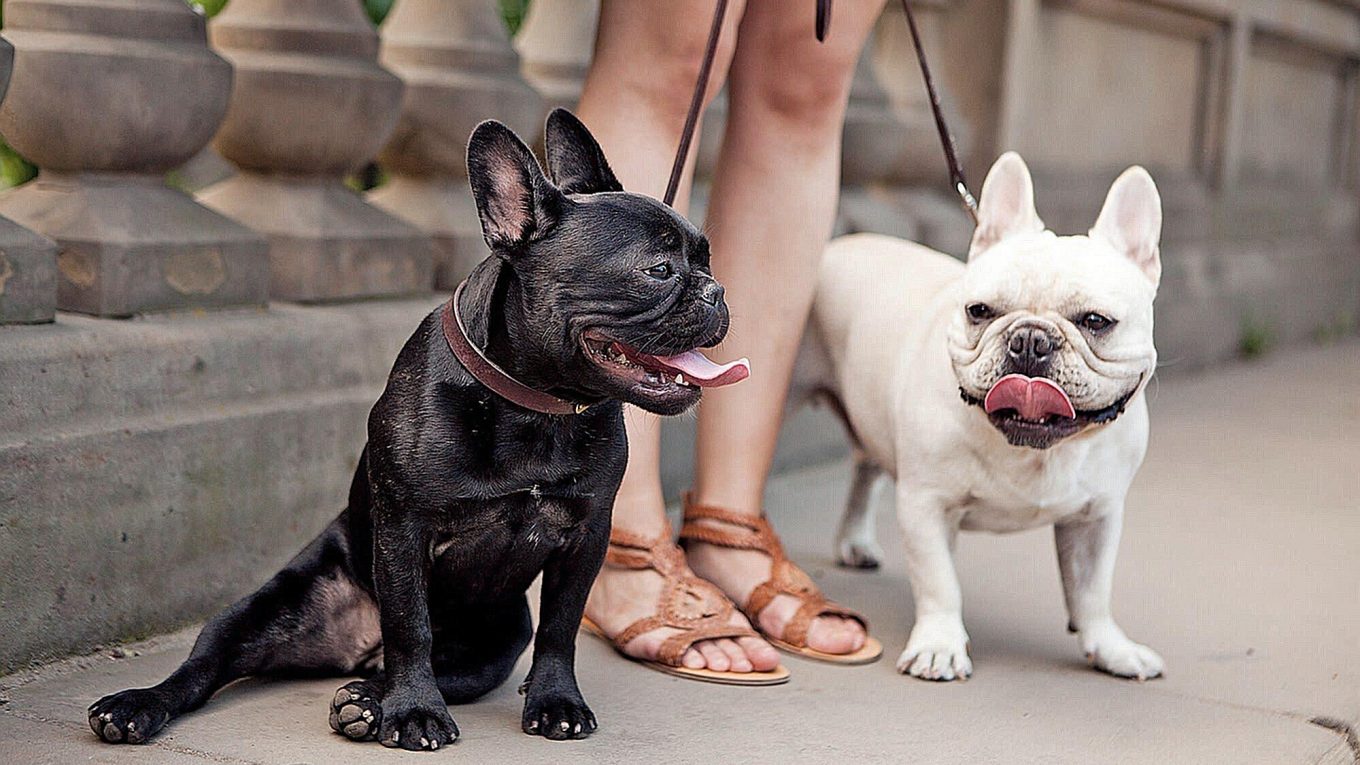Do French Bulldogs do better with another dog?
Adorable, comical, and fiercely loyal. These pint-sized pups have stolen the hearts of dog lovers everywhere. But here’s the burning question: do these lovable furballs fare better with a furry friend by their side? In this blog post, we’re diving deep into the benefits of having not just one, but two French Bulldogs ruling the roost.
Let’s talk companionship. It’s no secret that dogs thrive on social interaction, and Frenchies are no exception. Picture it: two French Bulldogs frolicking together, sharing endless playtime and snuggle sessions. It’s a match made in doggy heaven – double the fun, double the love.
Now, let’s get physical. French Bulldogs aren’t exactly known for their marathon-running skills (let’s be real, they’re more like couch potatoes). But having a partner in crime can actually boost their fitness game. With twice the wagging tails and puppy-like energy, these dynamic duos are more likely to stay active and burn off excess energy. Say goodbye to those extra pounds and hello to a healthier lifestyle.
Training is key when it comes to raising well-behaved dogs. And having two French Bulldogs under one woof presents a golden opportunity for accelerated learning.
One Frenchie watches and learns from the other, making training a breeze (well, almost). From potty training to perfecting commands, having a fellow Frenchie by their side sets them up for success.
And let’s not forget about you – the human in this equation. Having not one but two French Bulldogs means double the joy and entertainment for your whole family. Imagine witnessing their mischievous antics unfold before your eyes or getting smothered in kisses from both furry friends at once – it doesn’t get much better than that.
So, while French Bulldogs can thrive on their own, there’s something undeniably special about having a dynamic Frenchie duo. The companionship, increased exercise opportunities, and enhanced training potential are just a few of the many reasons why two is better than one.
So, if you’re thinking of adding a French Bulldog to your family, why not consider doubling the love? The laughter and lifelong friendship they’ll bring into your life will be worth every extra bit of effort.
The Benefits of Having a Companion Dog for French Bulldogs
Contents
- 1 The Benefits of Having a Companion Dog for French Bulldogs
- 2 Socializing Your French Bulldog with Other Dogs
- 2.1 Why Socialize Your French Bulldog with Other Dogs?/strong>
- 2.2 Starting Early: The Importance of Puppy Socialization/strong>
- 2.3 Positive Reinforcement: Making Socialization Fun/strong>
- 2.4 Supervision and Safety First/strong>
- 2.5 Variety is the Spice of Life: Exposing Your Frenchie to Different Dogs/strong>
- 2.6 Gradual Progression: Building Comfort and Confidence/strong>
- 2.7 Patience is Key: Each Dog is Unique
- 3 Factors to Consider Before Introducing Another Dog into the Household
- 4 Understanding Your French Bulldog’s Unique Personality and Needs
- 5 Pros and Cons of Having Another Dog for French Bulldogs
- 6 Tips on Choosing a Compatible Companion Dog for Your French Bulldog
- 7 Signs of Unhappiness in French Bulldogs Living Without a Companion Dog
- 8 How to Help Your French Bulldog Adjust to Having Another Dog Around
- 9 Conclusion
French Bulldogs are beloved companions known for their affectionate and sociable nature. These adorable dogs thrive on companionship and enjoy being around other dogs.
Here, we will explore the benefits of having a companion dog for French Bulldogs, including how it can alleviate separation anxiety, fulfill exercise needs, provide mental stimulation, teach social skills, and bring joy to their lives.
Alleviating Separation Anxiety:
French Bulldogs are prone to developing separation anxiety when left alone for long periods. Having another dog as a companion can provide them with the company and reassurance they need, reducing their anxiety levels. A furry friend can offer comfort, playtime, and a sense of security, making the time spent alone more bearable for your French Bulldog.
Fulfilling Exercise Needs:
French Bulldogs are a brachycephalic breed, meaning they have a shortened snout that can make exercise challenging for them. However, having a playmate can encourage them to be more active and engage in playtime. This is essential for their physical well-being and can help them maintain a healthy weight.
Providing Mental Stimulation:
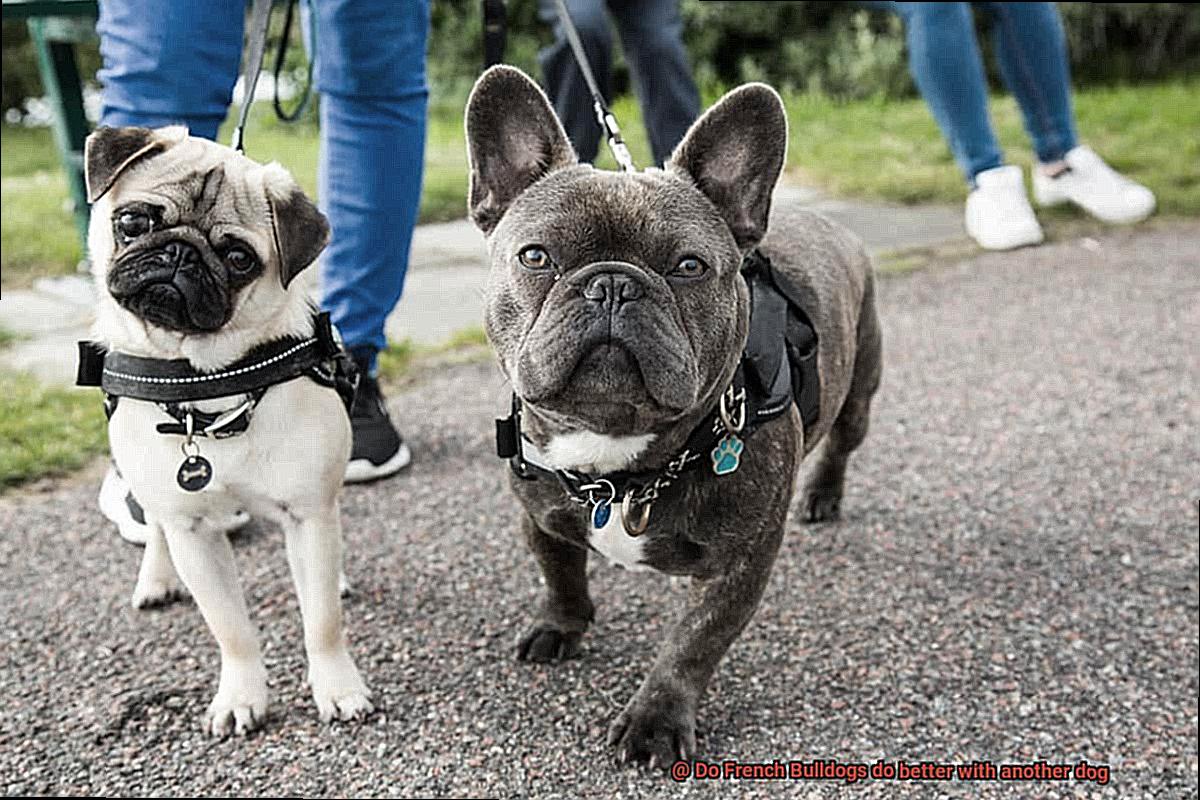
Interacting with other dogs can help keep French Bulldogs’ minds sharp and engaged. They can learn from each other, engage in play, and overall have a more enriched life. Mental stimulation is crucial for preventing boredom and ensuring a happy and well-adjusted French Bulldog.
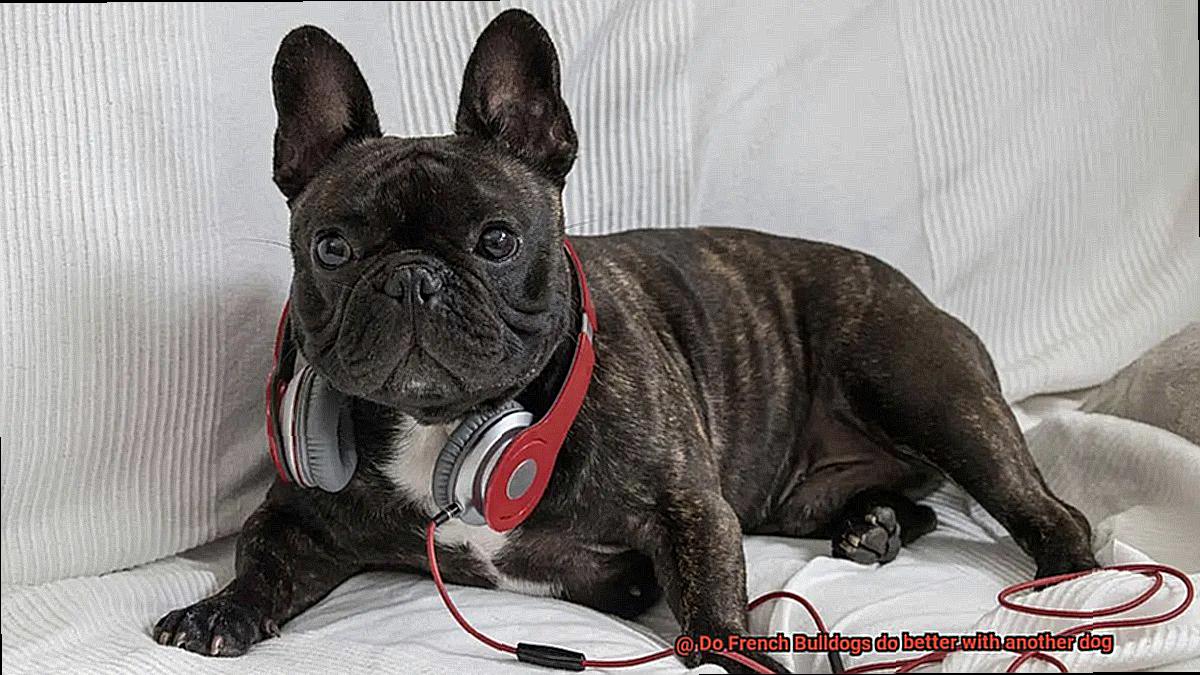
Teaching Social Skills:
Having a companion dog can teach French Bulldogs important social skills. Dogs learn a lot from observing and interacting with other dogs. By having a companion, French Bulldogs can learn proper canine behavior, communication cues, and develop better social skills overall. This is particularly important if your French Bulldog has limited exposure to other dogs.
Bringing Joy and Happiness:
Dogs are pack animals by nature, and having a constant companion can fulfill their social needs. French Bulldogs can develop a strong bond with their companion, leading to a happier and healthier life overall. The joy and happiness that come from having a furry friend can be seen in their wagging tails and playful antics.
Socializing Your French Bulldog with Other Dogs
If you’re wondering whether it’s important to socialize your furry friend with other dogs, the answer is a resounding yes. Socialization plays a crucial role in your French Bulldog’s overall well-being and development.
In this guide, we’ll delve into why socializing your French Bulldog is so important and provide you with practical tips to make the process a breeze. So grab a cup of coffee, sit back, and let’s dive in.
Why Socialize Your French Bulldog with Other Dogs?/strong>
- It builds proper social skills: Socializing helps your French Bulldog learn appropriate behavior around other dogs, reducing the likelihood of aggression or fear-related issues.
- Boosts confidence: Regular interactions with other dogs can boost your pup’s confidence, making them more comfortable in various environments.
- Reduces anxiety and fear: Socializing early on can help prevent anxiety or fear-related behaviors when encountering new dogs later in life.
Starting Early: The Importance of Puppy Socialization/strong>
- Begin at 8 weeks old: Start introducing your French Bulldog to other dogs as early as possible to build positive associations from the get-go.
- Controlled environments: Begin with calm, vaccinated, and well-behaved dogs in controlled settings to ensure positive experiences.
Positive Reinforcement: Making Socialization Fun/strong>
- Use treats and praise: Reward your French Bulldog for calm and friendly behavior around other dogs to reinforce positive associations.
- Playtime is key: Encourage playfulness and reward appropriate play behaviors like chasing or wrestling.
Supervision and Safety First/strong>
- Observe body language: Pay attention to your pup’s body language during interactions, looking out for signs of discomfort or stress.
- Be ready to intervene: Step in if necessary to prevent any aggressive or unsafe behavior.
Variety is the Spice of Life: Exposing Your Frenchie to Different Dogs/strong>
- Dog parks and playdates: Take your French Bulldog to dog parks or arrange playdates with friends who have friendly dogs.
- Puppy classes: Enroll your pup in puppy classes where they can learn proper socialization in a controlled environment.
Gradual Progression: Building Comfort and Confidence/strong>
- Gradually increase complexity: As your French Bulldog becomes more comfortable, expose them to different breeds, sizes, and energy levels of dogs.
- Encourage appropriate play: Encourage safe play behaviors like sniffing, chasing, and wrestling while discouraging any aggressive behavior.
Patience is Key: Each Dog is Unique
- Be patient and consistent: Remember that every dog is an individual, so give your Frenchie time to adjust at their own pace.
- Seek professional help if needed: Consult with a professional trainer or veterinarian if you have concerns about your French Bulldog’s socialization progress.
Factors to Consider Before Introducing Another Dog into the Household
Before you take the plunge, there are several factors to consider to ensure a smooth transition and a harmonious household. As an expert in French Bulldogs and all things dog-related, I’m here to guide you through the process.
So, grab a cup of coffee, sit back, and let’s dive into the world of introducing another dog to your French Bulldog clan.
- Breed Compatibility: Just like humans, dogs have their own unique personalities and temperaments. It’s crucial to consider breed compatibility when adding another dog to your household. French Bulldogs are known for their friendly and easygoing nature, so finding a breed with similar characteristics is key. Do your research and find a breed that matches well with your laid-back Frenchie.
- Age and Size Matters: Size does matter, especially when it comes to French Bulldogs. These lovable little creatures are on the smaller side, so it’s important to introduce a dog that is either similar in size or not significantly larger. Additionally, consider the age of the dogs. Older dogs may not have the energy levels or patience for a young, rambunctious pup.
- Temperament and Energy Level: The temperament and energy level of both dogs should align for a successful introduction. French Bulldogs are typically easygoing, so introducing a highly energetic and boisterous dog might not be the best idea. Take into account each dog’s personality and energy levels to ensure compatibility.
- Gender Dynamics: Just like humans, dogs can have preferences when it comes to companionship. Some dogs prefer same-sex buddies, while others get along better with the opposite sex. Consider the gender dynamics when introducing another dog into your household to reduce potential conflicts or dominance issues.
- Training and Socialization: Proper training and socialization are essential for a happy and well-behaved dog. Before bringing another dog home, make sure that both your French Bulldog and the potential new addition have been properly trained and socialized. Seek professional help if needed to address any behavioral issues before introducing another dog into the mix.
- Resources and Time: Adding another dog to your household requires additional resources and time. Consider whether you have the financial means to support another dog’s needs, including food, veterinary care, and supplies. Additionally, having multiple dogs requires more time and attention for training, exercise, and socialization. Make sure you have the necessary resources and time to provide for both dogs’ needs.
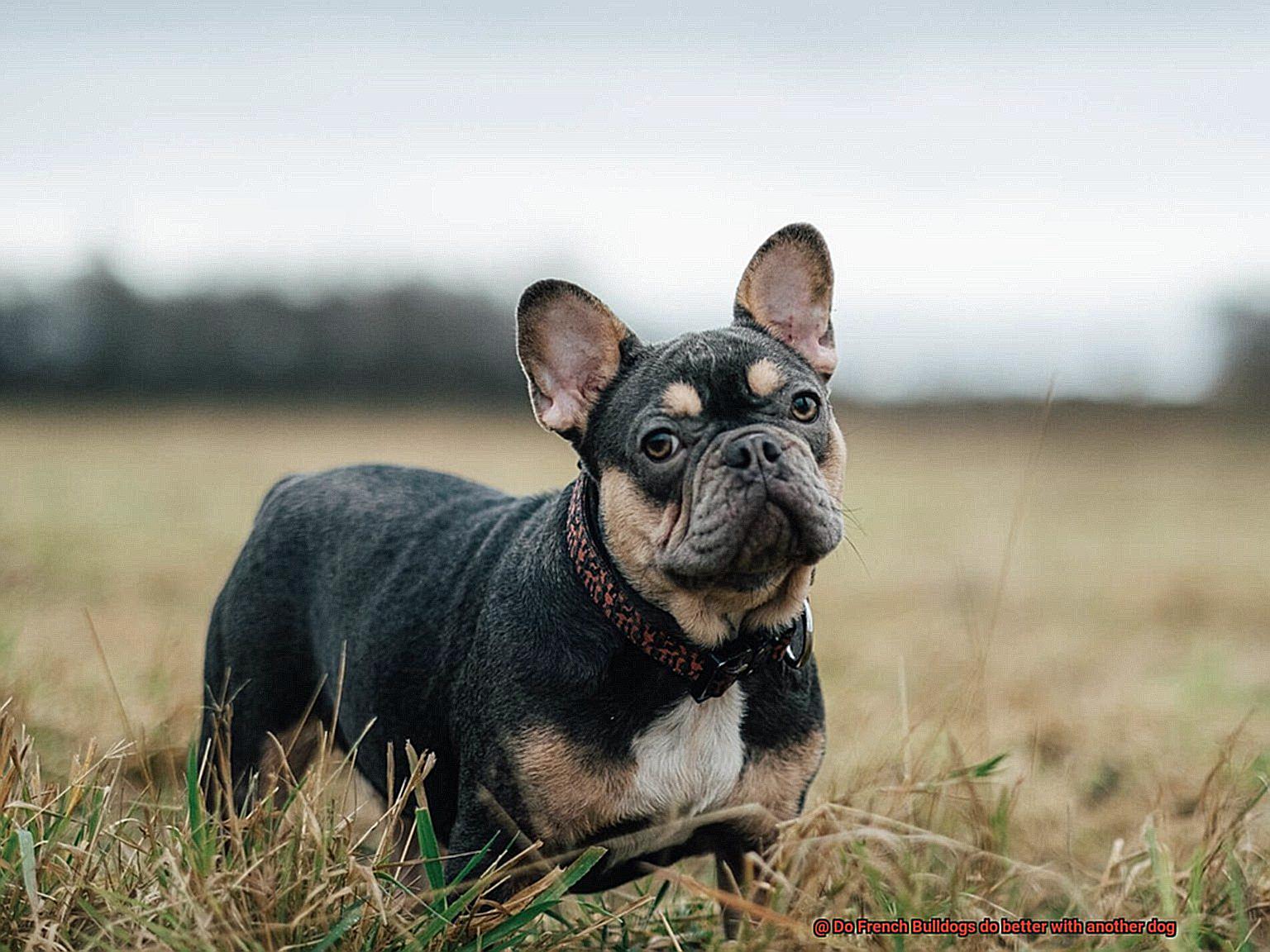
Understanding Your French Bulldog’s Unique Personality and Needs
French Bulldogs are often described as affectionate, playful, and sociable. However, just like humans, each individual French Bulldog has their own unique personality traits and needs.
So, how do you determine if your French Bulldog would benefit from having another canine companion in the household? Let’s dive into this topic and explore the factors to consider.
Understanding Your French Bulldog’s Personality
First and foremost, it is crucial to understand your French Bulldog’s personality. Observe how they interact with other dogs when you take them for walks or visit a dog park. Do they seem excited and friendly, or do they display signs of aggression or discomfort? This will give you a good indication of whether your Frenchie enjoys the company of other dogs or prefers to be the only dog in the household.
The Benefits of Canine Companionship
If your French Bulldog is friendly, social, and enjoys spending time with other dogs, introducing a new canine companion may be a positive experience for them. Having a furry friend to play and socialize with can provide mental stimulation and companionship. It can also help alleviate separation anxiety, as they won’t feel alone when you’re not around. Plus, it’s always heartwarming to see dogs form strong bonds and have fun together.
Respecting Your Frenchie’s Preferences
On the other hand, if your French Bulldog displays signs of aggression or discomfort around other dogs, it’s important to respect their preference for being the only dog in the household.
Some Frenchies may be more independent or territorial and may not appreciate sharing their space with another dog. Pushing them into a situation they’re not comfortable with can lead to stress, anxiety, and potential conflicts between the dogs.
Consider Your Resources
Before making a decision, it’s important to consider your own capabilities and resources.
Adding another dog to the household requires additional time, attention, training, and financial resources. Ensure that you are able to meet the needs of both dogs before making a decision. It’s essential to prioritize their well-being and ensure that any decision made is in their best interest.
Pros and Cons of Having Another Dog for French Bulldogs
French Bulldogs, with their affectionate and social nature, can greatly benefit from having another dog as a companion. However, before making the decision to bring home another furry friend, it is essential to consider the pros and cons to ensure a harmonious household.
Pros:
- Companionship: French Bulldogs thrive on social interaction, and having another dog can provide them with a constant companion. This can alleviate separation anxiety and loneliness when the owner is away for long periods.
- Exercise: Frenchies are not very active dogs and can easily become overweight without enough exercise. Having another dog to play and interact with can encourage them to be more active, engaging in physical activities that keep them fit.
- Mental Stimulation: French Bulldogs are intelligent dogs that require mental challenges to prevent boredom. Interacting with another dog provides opportunities for learning, problem-solving, and engaging in stimulating playtime activities.
Cons:
- Territoriality and Aggression: French Bulldogs can be protective of their owners and homes, potentially leading to conflicts over resources or territory when introducing a new dog. Proper introduction and training are crucial to prevent aggression.
- Additional Responsibilities and Expenses: Owning two dogs means increased responsibilities and expenses. Food, veterinary care, grooming, and other necessities must be provided for both dogs. Consider the cost before deciding to get another dog.
- Compatibility Issues: Dogs have different personalities, and it’s essential to consider your Frenchie’s compatibility with other dogs before bringing a new one home. Properly introducing dogs gradually is crucial for a smooth transition.
Tips on Choosing a Compatible Companion Dog for Your French Bulldog
It’s important to choose the right companion that is compatible with your French Bulldog’s temperament and energy level. In this article, we will provide you with some helpful tips on choosing a compatible companion dog for your French Bulldog.
Consider Temperament and Energy Levels:
French Bulldogs are generally low-energy dogs, so it’s best to choose a companion that matches their energy level. Look for a dog with a similar temperament to ensure a harmonious relationship.
Size Matters:
French Bulldogs are small in size, so it’s advisable to choose a dog of similar size or one that is not too large and overpowering. This will help prevent any dominance issues and ensure a safe and comfortable environment for both dogs.
Compatibility of Breeds:
Consider the compatibility of breeds when choosing a companion dog. Some breeds may have a higher prey drive or a more dominant personality, which may not be suitable for a French Bulldog’s gentle nature.
Introduce Potential Companions Gradually:
It’s crucial to introduce potential companion dogs to your French Bulldog gradually. Allow them to meet in a neutral environment and observe their interactions before making any decisions.
Seek Professional Advice:
Consulting with a professional dog trainer or behaviorist can provide valuable guidance on selecting a compatible companion dog for your French Bulldog. They can assess your French Bulldog’s needs and help you make an informed decision.
Signs of Unhappiness in French Bulldogs Living Without a Companion Dog
French Bulldogs are social animals that thrive on companionship. Living without a companion dog can lead to unhappiness and loneliness. Here, we will explore the signs that indicate a French Bulldog is unhappy without a companion dog.
Excessive Barking or Howling:
Loneliness and boredom can cause French Bulldogs to resort to vocalizing their distress. Excessive barking or howling is a common sign that they are feeling unhappy and seeking attention.
Destructive Behavior:
When French Bulldogs feel lonely or anxious, they may engage in destructive behaviors such as chewing furniture, digging holes, or scratching doors. These behaviors stem from frustration and boredom due to the lack of a companion dog.
Separation Anxiety:
French Bulldogs living without a companion dog may develop separation anxiety. They become excessively clingy, following their owners around the house, and showing signs of distress when left alone. Panting, pacing, drooling, and self-harm like excessive licking or chewing can be observed.
Decreased Appetite or Weight Loss:
The lack of social interaction and companionship can lead to a loss of interest in food. If your French Bulldog is not eating well or experiencing weight loss, it could be a sign of unhappiness due to the absence of a companion dog.
Signs of Depression:
Unhappiness without a companion dog can manifest in depression-like symptoms. French Bulldogs may become lethargic, withdraw from social interactions, and lose interest in activities they once enjoyed. They may spend more time sleeping or lying around and show little enthusiasm for playtime or exercise.
How to Help Your French Bulldog Adjust to Having Another Dog Around
Adding another dog to your family can be an exciting and rewarding experience, but it’s important to help your French Bulldog adjust to this new furry companion. With some patience, love, and a few helpful tips, you can ensure a smooth transition for both dogs. Here are some ways to help your French Bulldog adjust to having another dog around.
Introduce the new dog gradually:
To prevent overwhelming interactions, introduce the new dog to your French Bulldog slowly and in a controlled manner. Start by allowing them to sniff each other through a baby gate or from a distance. Gradually increase their proximity over time, observing their body language for signs of comfort or anxiety.
Provide separate spaces:
It’s essential for both dogs to have their own designated space in the house where they can retreat when they need some alone time. This could be a crate, a bed, or a specific room. Providing separate spaces ensures that each dog feels secure and has a place to relax without feeling crowded.
Supervise playtime:
When the dogs are ready to interact and play together, closely supervise their interactions. This allows you to intervene if any aggressive behavior occurs and ensures that both dogs are comfortable and happy during playtime. Gradually increase the duration of play sessions as they become more comfortable with each other.
Give equal attention and affection:
To prevent feelings of jealousy or neglect, make sure you give each dog equal attention, affection, and quality time. Spend one-on-one time with each dog, engage in individual play sessions, and maintain consistent routines for feeding, exercise, and training.
Maintain consistent routines:
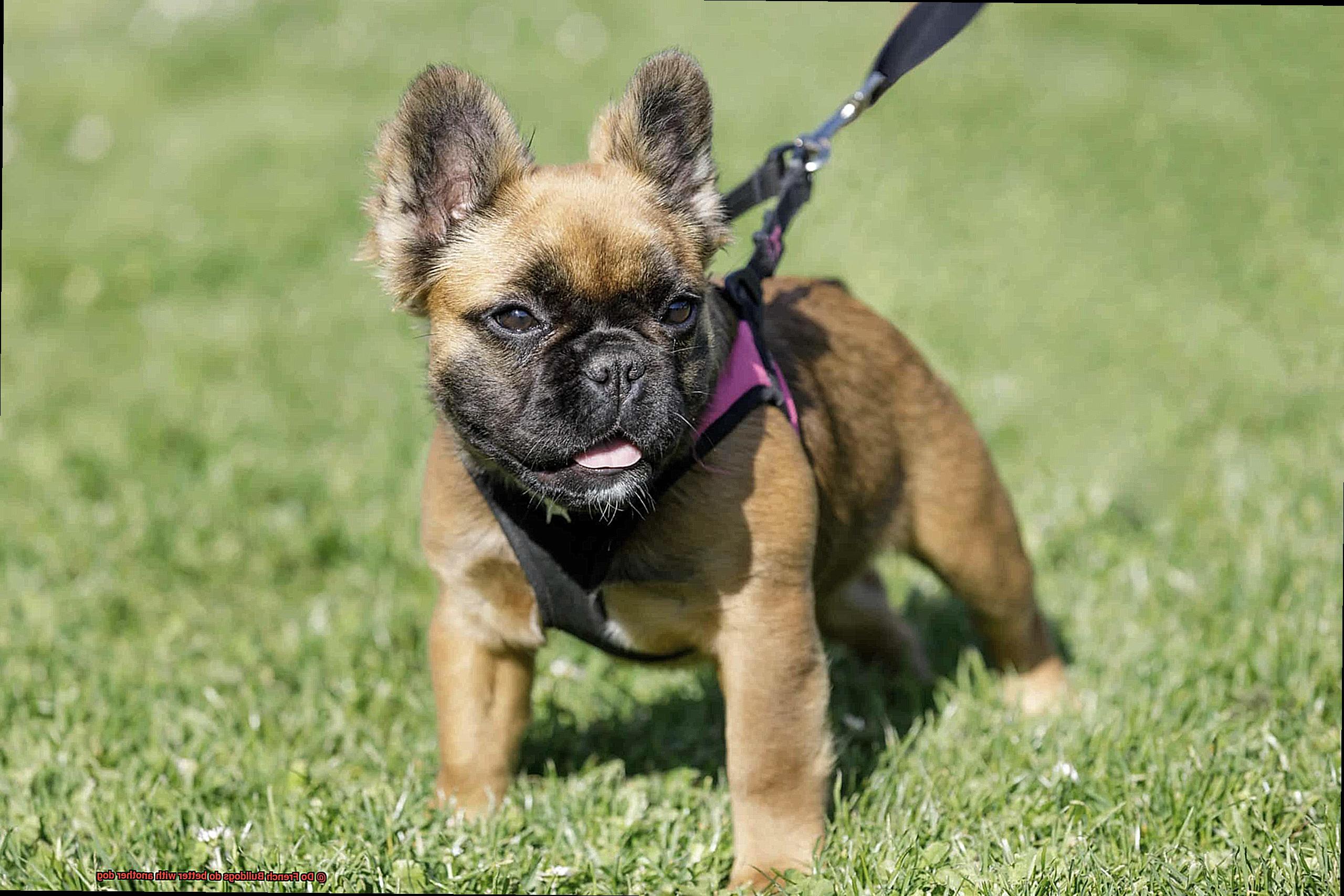
Dogs thrive on routine, so it’s important to maintain consistent schedules for both dogs. Stick to regular feeding times, exercise routines, and training sessions. This provides structure and stability for your French Bulldog and helps them adjust to the new dog’s presence.
Use positive reinforcement:
Reward both dogs for good behavior and positive interactions. Use treats, praise, or playtime to reinforce desired behaviors. Positive reinforcement helps to strengthen the bond between the dogs and encourages them to associate each other’s presence with positive experiences.
8aSaH0wxVh8″ >
Conclusion
In conclusion, it is clear that French Bulldogs thrive when they have the companionship of another dog.
Having a furry friend by their side not only provides them with constant company and entertainment but also helps alleviate any separation anxiety they may experience. Additionally, having another dog in the household can prevent boredom and destructive behavior in French Bulldogs, as they are known to be quite energetic.
However, it is important to note that introducing a new dog into the household should be done carefully, ensuring compatibility between the two animals.
